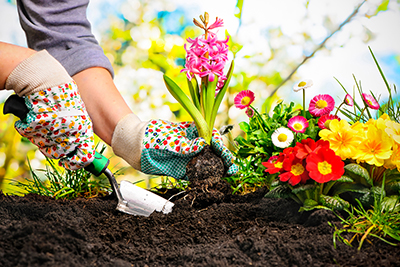Gardening for Health
As the snow starts to melt, the first robin of the season is spotted, and little bits of green start popping up from the ground, you might be hearing the garden call. Gardening is such a precious pastime, and with its innumerable health benefits, it can also be viewed as an important health activity. Let us look at some of its many benefits together.
Brings Joy and Boosts Mood
Have you ever started a plant from a seed? Can you remember the first time one of your seedlings sprouted? Do you remember the feeling that came with that? The joy and wonder that come with seeing that first sprout seem to grow with the plant as you marvel at all that comes from such a small seed.
The satisfying full-circle process of nurturing a plant can bring a special sense of fulfillment when your small seed grows into plant-bearing fruits, vegetables, herbs, or flowers for you to enjoy or admire.
Supports Clean Nutrition
Growing your own fruits, vegetables, and herbs gives you greater control and insight into their cultivation. You can monitor soil health, opt for organic pest control and soil-care methods, and harvest produce at optimal ripeness, maximizing their nutritional value.
Eases Anxiety and Helps Cope with Stress
Gardening often carries a spiritual dimension, offering a sense of connection to something greater than oneself. Engaging in outdoor activities such as gardening has been demonstrated to reduce perceived stress, anxiety, and anger responses. It can even influence gut microbes in children from preschool age [i] and contribute to decreased depression, anxiety, and improved weight management in older adults.[ii]
Supports the Immune System
I would argue that if you were to choose just one activity to support your immune system, gardening would be the ideal choice. Gardening involves interacting with various microbes, which can contribute to the diversity of your microbiome. Tending a garden exposes you to sunlight, fresh air, and regular exercise, all of which help build your body’s resilience. Additionally, if you grow your own food in the garden, you are providing yourself with nourishment that further supports your immune system. You can even cultivate plants traditionally used to bolster immune health, such as echinacea or elderberry.
 Encourages Focused Attention and Mindfulness
Encourages Focused Attention and Mindfulness
Growing plants encourages you to slow down and pay attention to the little ways they change each day. The calm, mindful focus that comes from tending the garden can spread to other areas of life as well and you may find yourself paying more attention as you move through your day.
Promotes Inclusivity
The garden can promote inclusivity on multiple levels. For one, gardening offers numerous approaches, ensuring there is something suitable for everyone’s preferences, interests, and skill levels.
Second, planting a garden fosters an ecosystem that showcases the significance of each participant. Bees pollinate flowers, leading to the growth of fruits and vegetables. In turn, these attract various animals and humans, facilitating a cycle of growth and interaction. Even weeds or typical garden pests contribute positively by enhancing soil quality or introducing different nutrients, underscoring the importance of inclusion and diversity within the garden ecosystem.
But Wait, What if I Don’t Have Enough Space, Time, or Ability for a Garden?
There are so many ways around these concerns because there are so many different ways to garden. If you do not have the space for a large backyard garden, try a container garden. You could even start with one plant in a small container. I often recommend starting with some lettuce in a container, since it is relatively easy to grow and you can enjoy multiple harvests from one plant. If you have a big space and are overwhelmed with where to begin, start with a couple of plants in a small section for the first year and grow from there. The garden will improve each year.
If physical-ability limitations are a concern for you, consider exploring adaptive gardening options online. From raised beds to vertical gardens, and from seated gardening techniques to valuable tips and tricks for injury prevention and endurance enhancement, there are a wealth of ideas, tools, and resources that ensure gardening is accessible to everyone, regardless of ability.
I hope you are now feeling inspired to get out and get your hands dirty this spring! See you in the garden!
 Dr. Felicia Assenza, HBSc, ND
Dr. Felicia Assenza, HBSc, ND
A graduate of the Canadian College of Naturopathic Medicine (CCNM) in Toronto, her goal in every patient visit is to share the knowledge and experiences that she gained on her own journey to help move others forward on their health journeys.
drfeliciaassenzand.com
[i] Sobko, T., S. Liang, W.H.G. Cheng, and H.M. Tun. “Impact of outdoor nature-related activities on gut microbiota, fecal serotonin, and perceived stress in preschool children: the Play&Grow randomized controlled trial.” Scientific Reports, Vol. 10, No. 1 (2020): 21993.
[ii] Soga, M., K.J. Gaston, and Y. Yamaura. “Gardening is beneficial for health: A meta-analysis.” Preventive Medicine Reports, Vol. 5 (2017): 92–99.

 Stores
Stores